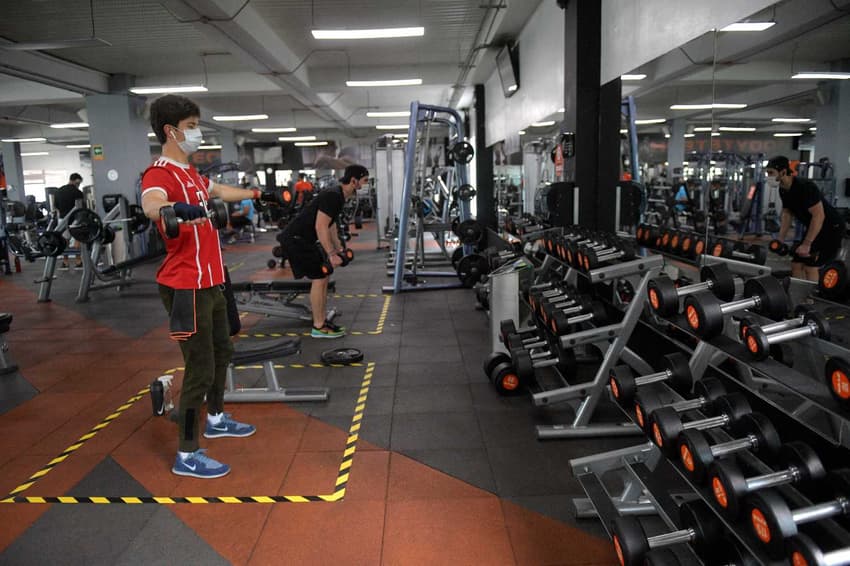7 false friends Spanish-speakers in Austria should avoid

From confusing a fitness studio with an academic institution to wondering why German speakers are looking for celestial beings when they go fishing, here are seven funny false friends for Spanish speakers to be aware of.
Navigating a new language and culture can be a thrilling adventure, but it’s not without its pitfalls. One of the challenges Spanish speakers face when living in German-speaking countries is the presence of ‘false friends’ - words that look or sound similar in both languages but have entirely different meanings.
These linguistic landmines can lead to amusing misunderstandings or, in some cases, somewhat awkward situations.
To navigate the German language confidently and avoid unintentional blunders, here are seven falsche Freunde for Spanish speakers to be aware of. Some are not so different from the ones which English speakers also love to make when speaking Deutsch.
el gimnasio/das Gymnasium
If you’re looking for somewhere to work out, you won’t find dumbbells and treadmills at das Gymnasium. In Austria, this term refers to a type of secondary school, typically for the most academic students. To discuss a fitness centre or gym, you should use ‘das Fitnessstudio’ or ‘das Fitnesscenter’.
el ángel/die Angel
The German word ‘die Angel’ might disappoint those expecting celestial beings; it actually means ‘fishing rod’, differing quite staunchly from its Spanish counterpart. To talk about a heavenly angel, you should use ‘der Engel’.
la prima/prima
‘Prima’ in German doesn’t refer to your cousin but instead means ‘cool’ or ‘great’. For instance, if somebody asked you ‘Wie findest du das neue Restaurant in der Stadt?’ (What do you think of the new restaurant in town?’, you could respond ‘ich finde es prima!’ (I think it’s great!).
To talk about your cousin, you’d use ‘der Cousin’ (male) or ‘die Cousine’ (female). Although less common, you might also encounter ‘der Vetter’ for a male cousin and ‘die Kusine’ for a female cousin.
el váter + der Vater
Looking for the bathroom in Austria? ‘El váter’ (the toilet in Spanish) won’t get you there and could lead to a hearty chuckle. It’s better to ask for ‘das Klo’ or simply ‘die Toilette’. ‘Der Vater’ in German simply means ‘father’.
el regalo/das Regal

Christmas gifts (Geschenke), which have nothing to do with a 'Regal'. Image by Gundula Vogel from Pixabay
You may be expecting a present if you hear the word ‘Regal’, but sadly somebody using this word is normally referring to a rack/shelves. The German term for present is ‘das Geschenk’.
alto/alt
These words share a similar structure but have vastly different meanings. ‘Alt’ translates to ‘old’ in German, not ‘tall’ like the Spanish ‘alto’. To describe someone as tall in German, use ‘groß’.
la rata/der Rat
Confusing ‘la rata’ with ‘der Rat’ could lead to an amusing conversation. In German, ‘der Rat’ means ‘advice’, not ‘rat’. The German word for the rodent is ‘die Ratte’.
Comments
See Also
Navigating a new language and culture can be a thrilling adventure, but it’s not without its pitfalls. One of the challenges Spanish speakers face when living in German-speaking countries is the presence of ‘false friends’ - words that look or sound similar in both languages but have entirely different meanings.
These linguistic landmines can lead to amusing misunderstandings or, in some cases, somewhat awkward situations.
To navigate the German language confidently and avoid unintentional blunders, here are seven falsche Freunde for Spanish speakers to be aware of. Some are not so different from the ones which English speakers also love to make when speaking Deutsch.
el gimnasio/das Gymnasium
If you’re looking for somewhere to work out, you won’t find dumbbells and treadmills at das Gymnasium. In Austria, this term refers to a type of secondary school, typically for the most academic students. To discuss a fitness centre or gym, you should use ‘das Fitnessstudio’ or ‘das Fitnesscenter’.
el ángel/die Angel
The German word ‘die Angel’ might disappoint those expecting celestial beings; it actually means ‘fishing rod’, differing quite staunchly from its Spanish counterpart. To talk about a heavenly angel, you should use ‘der Engel’.
la prima/prima
‘Prima’ in German doesn’t refer to your cousin but instead means ‘cool’ or ‘great’. For instance, if somebody asked you ‘Wie findest du das neue Restaurant in der Stadt?’ (What do you think of the new restaurant in town?’, you could respond ‘ich finde es prima!’ (I think it’s great!).
To talk about your cousin, you’d use ‘der Cousin’ (male) or ‘die Cousine’ (female). Although less common, you might also encounter ‘der Vetter’ for a male cousin and ‘die Kusine’ for a female cousin.
el váter + der Vater
Looking for the bathroom in Austria? ‘El váter’ (the toilet in Spanish) won’t get you there and could lead to a hearty chuckle. It’s better to ask for ‘das Klo’ or simply ‘die Toilette’. ‘Der Vater’ in German simply means ‘father’.
el regalo/das Regal

You may be expecting a present if you hear the word ‘Regal’, but sadly somebody using this word is normally referring to a rack/shelves. The German term for present is ‘das Geschenk’.
alto/alt
These words share a similar structure but have vastly different meanings. ‘Alt’ translates to ‘old’ in German, not ‘tall’ like the Spanish ‘alto’. To describe someone as tall in German, use ‘groß’.
la rata/der Rat
Confusing ‘la rata’ with ‘der Rat’ could lead to an amusing conversation. In German, ‘der Rat’ means ‘advice’, not ‘rat’. The German word for the rodent is ‘die Ratte’.
Join the conversation in our comments section below. Share your own views and experience and if you have a question or suggestion for our journalists then email us at [email protected].
Please keep comments civil, constructive and on topic – and make sure to read our terms of use before getting involved.
Please log in here to leave a comment.